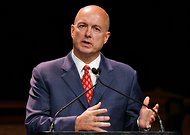 Lucas Jackson/ReutersDavid Sokol was once chairman of MidAmerican Holdings, a part of Berkshire Hathaway.
Lucas Jackson/ReutersDavid Sokol was once chairman of MidAmerican Holdings, a part of Berkshire Hathaway.
The Securities and Exchange Commission has decided not to file insider trading charges against David L. Sokol, a onetime top lieutenant at Berkshire Hathaway, Mr. Sokol’s lawyer said Thursday.
Mr. Sokol came under scrutiny in 2011 after abruptly resigning as chairman of Berkshire’s MidAmerican Energy Holdings, one of the many holdings of the investment conglomerate run by the billionaire Warren E. Buffett. At the time, Berkshire revealed that Mr. Sokol bought shares in Lubrizol, a maker of lubricants that he wanted Mr. Buffett to buy. Mr. Sokol bought the shares about two months before Berkshire announced a $9 billion acquisition of the company. After the deal was announced, the value of his Lubrizol stake rose by $3 million.
But Mr. Sokol’s lawyer, Barry Wm. Levine, said that the S.E.C. informed his client on Thursday that it had completed its inquiry and decided not to pursue a civil enforcement action.
Mr. Levine said he was happy that his client was “exonerated” and that Mr. Sokol never acted improperly in the trades. “He is the paragon of rectitude,” said Mr. Levine, a partner at the law firm Dickstein Shapiro in Washington.
John Nester, a spokesman for the S.E.C., declined to comment on Thursday. The agency typically does not comment when it decides not to pursue action in such cases. The news was first reported online by The Wall Street Journal.
Mr. Sokol’s resignation in 2011 was a rare black eye for Berkshire. A star manager, Mr. Sokol had run several Berkshire subsidiaries, including MidAmerican Energy and NetJets, which sells fractional ownerships of private jets. He was long considered to be a leading candidate to succeed Mr. Buffett, 82.
Mr. Sokol, now 56, had also become a crucial player in the conglomerate’s frequent deal-making, earning the nickname “Mr. Fix-it.” He served as a point man for Mr. Buffett on a number of potential transactions, particularly during the financial crisis.
His sudden resignation caught Berkshire by surprise. Mr. Buffett said he did not ask for Mr. Sokol’s resignation, suggesting at the time that it was a personal decision by Mr. Sokol.
Mr. Buffett initially defended his protégé’s trading. “Neither Dave nor I feel his Lubrizol purchases were in any way unlawful,” Mr. Buffett said at the time.
But additional information surfaced after the Berkshire board investigated Mr. Sokol’s trading record. Berkshire directors ultimately accused Mr. Sokol of misleading the company about his personal stake in Lubrizol.
Mr. Sokol bought $10 million worth of stock in Lubrizol shortly before bringing the company to Mr. Buffett’s attention, according to the board. While Mr. Sokol made a “passing remark” to Mr. Buffett about his trading, the board said that Mr. Sokol did not tell Mr. Buffett that he had bought his stake in Lubrizol after Citigroup bankers had pitched the company as a potential takeover target. He also bought some of the shares, according to the Berkshire directors, after learning that Lubrizol might entertain a takeover offer.
“His misleadingly incomplete disclosures to Berkshire Hathaway senior management concerning those purchases violated the duty of candor he owed the company,” the board’s report in 2011 says. It adds that Mr. Sokol may have failed his fiduciary duty under the law of Delaware, where Berkshire is incorporated.
At the time, Mr. Levine said that Mr. Sokol was considering a personal investment in Lubrizol since summer 2010, before meeting with bankers to discuss the company as a potential takeover target.
Still, Mr. Buffett said the trades violated company trading policy and called Mr. Sokol’s actions “inexplicable and inexcusable.”
He also provided testimony to S.E.C. investigators. Meanwhile, Berkshire continued to pay Mr. Sokol’s legal bills. Last spring, Mr. Buffett claimed those bills reached nearly $200,000 a month.
Mr. Buffett could not be immediately reached for comment on Thursday night.
But later in 2012, S.E.C. lawyers decided that there was insufficient evidence to mount a case against Mr. Sokol. The evidence was circumstantial, S.E.C. officials concluded, and it was unclear whether Mr. Sokol had a true window into the Lubrizol deal-making process. He also had no indication at the time of his stock trades that Mr. Buffett would be interested in acquiring the company.
Since resigning from Berkshire, Mr. Sokol has been managing his own portfolio, Mr. Levine said.
Pradnya Joshi contributed reporting.
This post has been revised to reflect the following correction:
Correction: January 4, 2013
A summary with an earlier version of this post misspelled the surname of the billionaire investor. He is Warren E. Buffett, not Bufett.
Article source: http://dealbook.nytimes.com/2013/01/03/s-e-c-ends-scrutiny-of-former-top-aide-to-buffett/?partner=rss&emc=rss